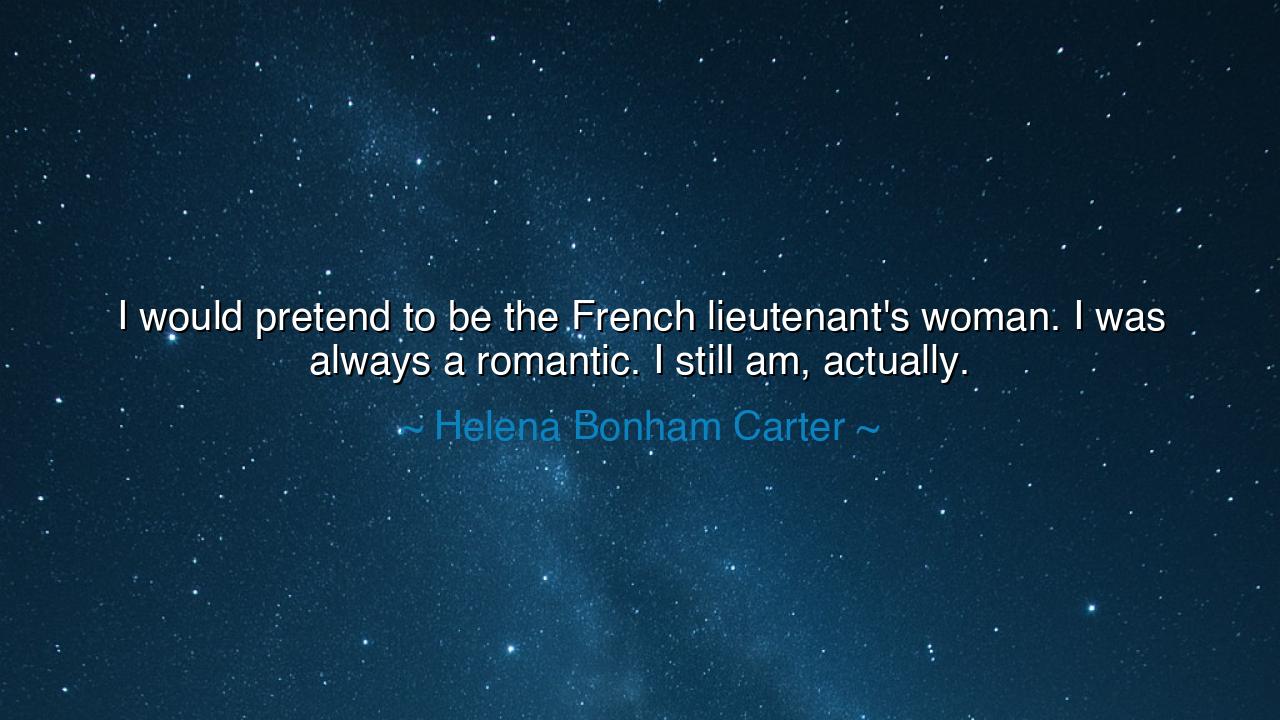
I would pretend to be the French lieutenant's woman. I was always
I would pretend to be the French lieutenant's woman. I was always a romantic. I still am, actually.






The words of Helena Bonham Carter—“I would pretend to be the French lieutenant’s woman. I was always a romantic. I still am, actually.”—are steeped in memory, imagination, and longing. They reveal the heart of a dreamer who, even in youth, sought refuge and delight in the world of stories. To pretend to be the French lieutenant’s woman is not simply to mimic a role, but to inhabit an archetype: the mysterious figure, cloaked in yearning, bound to love and sorrow, yet radiant with passion. It is the declaration of one who has always lived not only in the world as it is, but in the world as it might be.
When she proclaims that she was always a romantic, she speaks of more than mere love. Romanticism is the spirit that exalts imagination above cold reason, that dares to feel deeply, to embrace beauty even when it is tinged with tragedy. To be a romantic is to live with eyes turned toward the horizon, forever seeking something greater than the mundane. And to confess, “I still am, actually,” is an act of courage—for in an age that prizes irony and detachment, she dares to say she has not abandoned the heart’s capacity to dream.
The origin of her vision lies in literature and film. The French Lieutenant’s Woman, both in John Fowles’ novel and in the celebrated film adaptation, is a story steeped in passion, secrecy, and the conflict between societal duty and the longings of the heart. To pretend to be such a woman in youth is to step into a world where emotions reign supreme, where every glance and every silence carries weight. Bonham Carter’s imagination, shaped by such tales, is an echo of the Romantic tradition that once gave us the poetry of Byron, the music of Chopin, and the paintings of Turner.
History is filled with those who, like Bonham Carter, carried the soul of a romantic into their work and life. Consider the poet Emily Dickinson, who, though she lived much of her life in seclusion, wrote with passion so intense that her words still burn with longing today. She too pretended, imagined, and lived in worlds unseen. And though many dismissed her as eccentric, her romantic vision gave rise to some of the most enduring poetry of the English language. Just as Dickinson’s secluded room became a palace of imagination, so too did Bonham Carter’s youthful play-acting kindle the flame of her artistry.
Yet there is also humility in her confession. To admit that she “still” is a romantic suggests that many lose this quality as they age, trading wonder for cynicism, longing for resignation. But she has held fast. And herein lies the deeper teaching: that to remain a romantic is not naïveté, but strength. It is to refuse the deadening weight of despair, to keep faith with beauty even when the world would strip it away. To be a romantic is to preserve the childlike fire of imagination within the heart of the adult.
The lesson for us, then, is to guard our own sense of romance. Do not let the hardships of life silence your longing for beauty, nor let practicality extinguish your dreams. To pretend, to imagine, to dream of being more than you are—these are not escapes, but exercises of the soul. In doing so, you keep alive the flame that inspires creation, love, and courage.
Practically, this means making space in life for imagination. Read stories that stir the heart, walk beneath the stars with wonder, let yourself weep at music or rejoice at a painting. Do not be ashamed of dreaming, nor of feeling deeply. And when the world mocks sentiment as weakness, remember that the greatest artists, leaders, and visionaries of history were all, in their way, romantics—those who saw not only the world before them, but the world that could be.
Thus, Helena Bonham Carter’s words are more than nostalgia; they are a charge to us all. She reminds us that the romantic spirit is not meant to fade with youth, but to endure through the years, shaping our lives with imagination, tenderness, and courage. To be a romantic is to keep the heart alive—and that is the greatest artistry of all.






AAdministratorAdministrator
Welcome, honored guests. Please leave a comment, we will respond soon